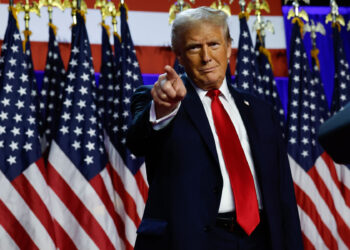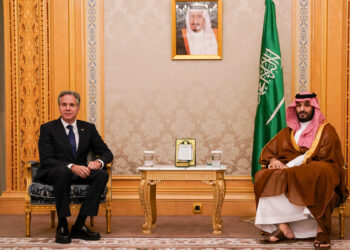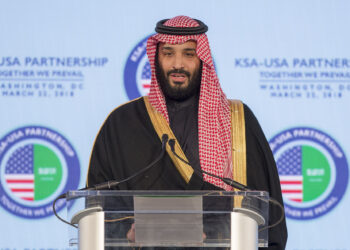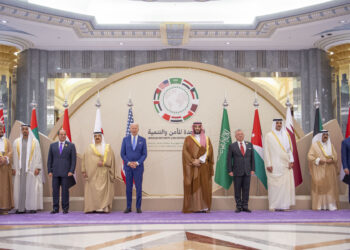Mike Eisner is the General Counsel and Chief Operating Officer of DAWN.
عربي
I was no more than six feet away when the shot rang out. The kid fell backwards. The officer stood above him, clutching a pistol, a wisp of smoke rising from the barrel. The kid, crying and spitting blood, was dead within a minute.
It was only my first week in Chile, and I had been strolling through downtown Santiago. The slight, unarmed kid walked right by me before pickpocketing another passerby. He had tried to escape through the crowd, but the police officer caught him by the collar and fired in broad daylight.
"Asesino!" someone yelled. Others joined in, until a crowd had gathered, surrounding the officer. Murderer, murderer, they chanted. The standoff didn't last long. A busload of soldiers arrived soon after and dispersed the crowd at gunpoint.
I was just out of law school and in Chile on a grant from the U.S. Agency for International Development to help establish student-run law journals in two Chilean law schools. Law journals didn't exist in Chile at the time. The day after the shooting, I met my USAID liaison at the U.S. Embassy in a leafy neighborhood of Santiago. We talked about the status of Chile's incipient democracy. The year before my arrival, in March 1990, Patricio Aylwin had taken office as the first civilian elected president after 17 years of military dictatorship under Gen. Augusto Pinochet. Chilean democracy was still tenuous. After losing the election, Pinochet remained head of the army and retained loyalists in the senior ranks of the military and intelligence.
When we were done talking about Chile's politics, the USAID officer asked me about my first impressions of the country. I told him about my initial meetings with law students, my visit with the dean, and the kid shot point blank in downtown Santiago.
"Democracy is a long game," he said.
"Tell that to the dead kid," I replied.
He took a long minute to respond. "Do you know why we're funding this project?"
I glanced at his bookcase: mostly history, ancient. Big tomes of it, wedged between two bottles of whiskey.
"Because training law students is cheaper than training soldiers," he said. "A better investment too."
He was right about that.
In the name of democracy promotion and nation-building, the U.S. has trained a lot of soldiers over the past two decades during the so-called "freedom" operations in Afghanistan and Iraq. To say the military training was a bad investment would, of course, be a gross understatement. Indeed, images of Taliban soldiers decked out in U.S. Army fatigues last summer, and driving American Humvees as the last American troops left Kabul, seemed a fitting denouement for two decades of forever wars.
In the face of these disastrous military interventions, Donald Trump, first as a candidate and then as president, advocated abandoning the whole idea of promoting democracy. Though it lacked the intellectual heft of foreign policy experts from both parties—the same Republicans and Democrats who had gotten the U.S. into the forever wars—Trump's position made eminent sense to many Americans. Beyond the huge price tag of democracy promotion, the U.S. doesn't seem to be very good at it.
A successful model of democracy promotion plays to the greatest strength of America's system of government and of other democracies around the world: the rule of law.
- Michael Eisner
All these past mistakes underline the need for the U.S. to reassess and revamp its strategy for democracy promotion, while still recognizing its critical importance to U.S. national security and the broader global struggle today against resurgent authoritarianism, especially from China and Russia. Portraying the U.S. as a declining power, the Chinese Communist Party, for one, has declared the superiority of its model of autocratic capitalism, while engaging in a concerted disinformation campaign to undermine democratic governments. An American retreat around the world and abandonment of democracy promotion might well amount to ceding the field to China and other autocrats.
But how to promote democracy in a way that avoids mistakes of the past?
As the first order of business, the U.S. must get its own house in order and show the world that the autocrats' assessment is wrong—that nations don't have to sacrifice political and civil rights to gain the touted benefits of prosperity and stability. Beyond strengthening its own democracy, the U.S. can promote democracy abroad by enabling local activists, civil society groups and dissident exiles to establish their own platforms from which they can win the hearts and minds of their fellow citizens. One of the most effective platforms, as I learned in Chile, could be a law journal.
*
The first journal meetings at the law schools in Santiago were packed, standing room only. As I described the journal's purpose, the Chilean students stared at me skeptically, slightly amused by the notion of committing ideas to paper that had not only been verboten just a few years beforehand, but had led to former law students ending up floating face down in the Mapocho River, victims of Pinochet's military junta. But these students returned for a second meeting and many more that followed.
I quickly learned that running a law journal that has been in existence for decades, as I did at Yale, is very different from starting one from scratch. I provided the students with a long to-do list, but they had to wrench the journal into being on their own terms without the ubiquitous Bluebook or the prestige afforded to student editors or published authors.
The experience had a profound impact on them. They were brainstorming, debating and honing their vision not only of the journal, but also of their country's future, including the rule of law, human rights and accountability for Pinochet-era abuses. The burst of ideas unleashed in creating these two new law journals, I later found out, would have far-reaching effects in nurturing democratic values in Chile and beyond.
Halfway through my year in Chile, I returned to the U.S. and met with two of my former professors to discuss creating a more lasting connection between Yale and the Chilean law schools. One year later, in the spring of 1993, the Linkages Program was launched. Yale Law School selected five students for the inaugural group, who each spent four weeks in Santiago, working as advisers to the new law journals and meeting with other students and faculty.
Thirty years later, these law journals are still going strong, and student editors have gone on to become leaders of democratic reform in Chile. Alumni include founders and heads of civil society organizations, new political parties, senators and deputies in Chile's Congress, and members of the body tasked with drafting a new Chilean constitution. Meanwhile, the Linkages Program has developed into a vibrant student exchange program and has expanded to include Argentina and Brazil, where Yale law students helped create other student-run law journals.
The exchange program has also given birth to an intellectual center of gravity for democratic thought in Latin America. Known by its Spanish acronym, SELA—Seminario en Latinoamérica de Teoría Constitucional y Política—it hosts an annual gathering for a community of scholars and law professors from across the region, who explore and debate practical, theoretical and philosophical legal issues that revolve around democracy and accountability.
It will take more than a summit or a few speeches to revive America's democracy promotion. What's really needed is the hard, patient work of empowering and enabling local civil society leaders and dissident exiles, so they can wage their own democratic struggle.
- Michael Eisner
In helping local civil society establish a powerful platform to spread democratic values, the Linkages Program represents a successful model of democracy promotion that plays to the greatest strength of America's system of government and of other democracies around the world: the rule of law. The project is cheap too, costing some $2 million since it began in 1993. The program's impact on democracy promotion isn't quantifiable, but it's safe to say that its return on investment exceeds both long and costly military interventions in Afghanistan and Iraq, which sowed far more destruction than freedom. It so happens that Chile ranks well ahead of the United States in prominent democracy indexes, with a particular strength in the rule of law.
The lessons of the Linkages Program can and should be duplicated with other U.S. law schools and other countries on the frontlines of the struggle between democracy and autocracy—the "partly free," "flawed democracies" and "hybrid regimes" on those democracy indexes. Indeed, one of the Linkages Program's founders, Prof. Owen Fiss, recently expressed interest in expanding it to include countries in the Middle East and North Africa, and has already reached out to faculty members in Tunisia and Morocco.
*
This kind of exchange is, of course, not possible with autocratic regimes that ban any kind of independent civil society. There is no realistic, on-the-ground option for promoting democracy in those countries, let alone for establishing student-run law journals. But the U.S. can still support democratic struggles in other ways, in particular by protecting and empowering dissident exiles.
These dissidents often have more political legitimacy than the autocratic regimes that view their dissent as an existential threat, which is why they have tried to extinguish it. While the murder of Saudi journalist Jamal Khashoggi by a Saudi government hit team in 2018 represents the most brutal and brazen recent example of an attack on a dissident abroad, such transnational violence by authoritarians has become commonplace and often flies under the radar. China has led the way, quietly building up a vast campaign of intimidation and violence, involving assassinations, renditions—often with the cooperation of host states—cyberwarfare, and a network of informants and spies across the world, including in the U.S.
China is not alone. Since Khashoggi's murder, Saudi Crown Prince Mohammed bin Salman, widely known as MBS, has honed another mode of silencing dissident exiles: targeting their families. After Canadian security services reportedly foiled a Saudi operation to kill former top Saudi intelligence official Saad Aljabri, the Saudi government banned his children from travel, then disappeared them. Since then, the Saudi government has arrested and tortured Aljabri's son-in-law, according to a lawsuit Aljabri filed against MBS in a U.S. District Court in Washington, and has detained some 40 members of Aljabri's family along with associates.
The U.S. government must do more to protect dissidents abroad, especially in the U.S., and preserve their ability to expose abuses by their own governments and advocate for democratic reforms. The Biden administration took an important step in enacting the "Khashoggi Ban," a new visa restriction on foreign officials who persecute dissident exiles or their family members. But the U.S. government needs to put teeth into the ban by applying it to senior officials of abusive governments, including MBS in the case of Saudi Arabia, while tacking on economic sanctions and enlisting America's democratic allies in building a global system of sanctions and legal protections for dissidents around the world.
There is no shortage of innovative ideas to promote democracy abroad. Michael McFaul, the director of Stanford's Freeman Spogli Institute for International Studies, has proposed the creation of a global marketplace platform—what he dubbed the International Platform for Freedom—that would match donors, including individuals, foundations and governments, with vetted civil society organizations and human rights defenders. Think of a dating app for democracy promotion. Or, as McFaul put it, "eBay, Craigslist, LinkedIn, Khan Academy, Amazon, PayPal, Substack, and Clubhouse all in one, designed exclusively for small-d democrats."
Susan Markham and Stephenie Foster, partners at Smash Strategies, a strategic advisory group, have focused on helping organizations empower women and promote gender equality. They advocate for a more feminist foreign policy as "a framework for transforming how the U.S. government supports democracy abroad and addresses power imbalances that serve as barriers to women's leadership."
A new task force on democracy promotion led by Freedom House has urged the U.S. to take the lead in developing a global strategy to promote an open democratic internet while combating the "digital-authoritarian model" of firewalls and constant cyber-surveillance.
The common thread that runs through all these ideas is that they seek to empower indigenous actors who have a legitimacy that no external actor can ever possess; they cost a fraction of America's failed "freedom" operations by military force; and they carry the potential of a big upside: an actual return on investment in the promotion of democracy.
In convening his much-anticipated Summit for Democracy late last year, President Joe Biden billed it as "an opportunity to listen, learn and engage with a diverse range of actors whose support and commitment is critical for global democratic renewal," as part of his promise to "put democracy and human rights at the heart of U.S. foreign policy." There was plenty to criticize about the summit, starting with the invite list, which included a number of countries deemed "partly free" or "not free" at all by leading democracy indexes. Still, the summit represented an official and important recognition by the Biden administration of the grave challenge posed by the rise of the autocratic model and the need to meet that challenge not alone but in concert with other nations.
Let's hope the Biden administration follows through on that recognition with concrete measures. It will take more than a summit or a few speeches to revive America's democracy promotion. What's really needed is the hard, patient work of empowering and enabling local civil society leaders and dissident exiles, so they can wage their own democratic struggle.
A year after I returned from Chile, I met the inaugural class of Yale law students from the Linkages Program, all of whom had supported these new law journals in Santiago and worked closely with Chilean law students and faculty. We sat at the Spanish language table in the dining hall. They asked a lot of questions about meaning and purpose, legal theory and philosophy. I responded as best I could.
La democracia es un juego largo, y no hay meta. Democracy is a long game, and there is no finish line.







